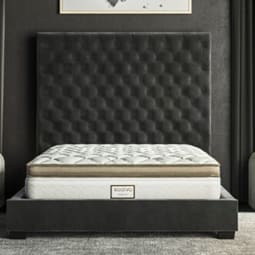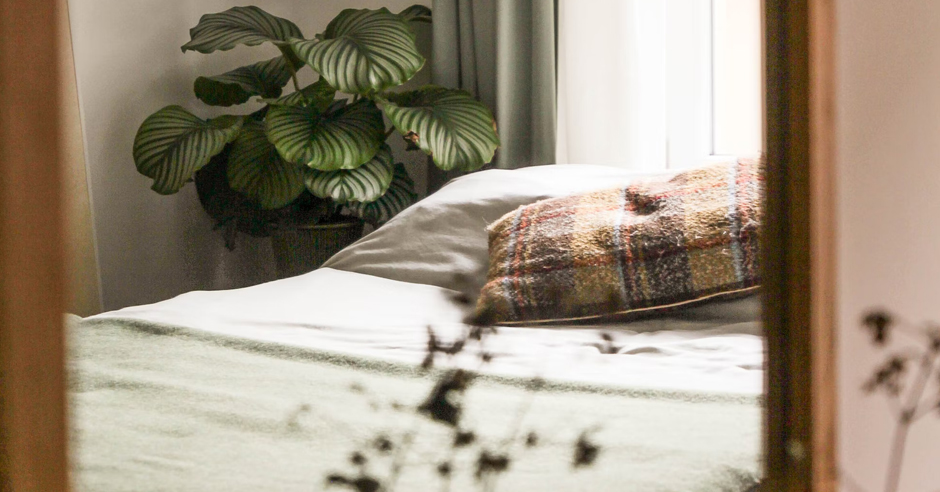Allergies Keeping You Up? 6 Mattresses To Help You Breathe Easier
Easier, breezier sleep.


Contributing writer
Contributing writer
Jamey Powell is a writer and editor living in Brooklyn, NY. Previously the senior market editor at Healthline.com, she has years of experience scouring endless product reviews and testing out the latest and greatest products in the sleep, fitness, and nutrition markets.
November 2, 2022 Our editors have independently chosen the products listed on this page. If you purchase something mentioned in this article, we may Name something more annoying in life than disrupted sleep—we’ll wait. If sneezing and sniffling are keeping you up at night, you're not alone. Up to 42% of the U.S. population experience allergies1, and these symptoms are proven to be extremely disruptive to your sleep2. The good news? While people you'll need to pay even closer attention to the materials you're sleeping on, the best mattresses for allergies will have you breathing easier, and feeling *way* more rested in the morning. Keep reading to find our list of allergist-guided recommendations, and to learn more about what could be causing your symptoms—plus, what materials to look for in the best mattresses for allergies.
A quick peek at the best mattresses for allergies:
Mattresses & allergies
“There are a couple different ways that mattresses can contribute to allergies,” explains allergist Anjuli Mehrotra, MD. “You could be allergic to dust mites or even mold, mildew, or pet dander that can accumulate in a mattress. Or, you could react to the materials the mattress is made from.”
Allergy specialist Morris Nejat, MD, agrees that, while some people are allergic to the materials of the mattress itself, allergens can accumulate over time. “Mattresses typically cause allergies when allergens from the air get trapped inside,” says Nejat. So, if you’re experiencing a new reaction to an older mattress, it may be time for a fresh start.
While allergic reactions vary from person to person, there are a few common allergy instigators to look out for in a mattress.
Dust mites: “Dust mites are microscopic mites that live in house dust and live off of dead human skin. Some individuals are allergic to their feces,” explains Nejat.
Material allergens: Latex is a popular mattress material for its buoyant support, and antimicrobial and sustainable properties. Unfortunately, some folks have a latex allergy, which can make these mattresses unsuitable for sleeping. “Latex is a growing allergen that can cause reactions such as hives, rashes, and difficulty breathing and may be more severe than the reactions caused by dust mites,” says Mehrotra. Wool is another common material found in natural mattresses that can be problematic for folks with an allergic aversion.
Mold, mildew, or pet dander: Mold and mildew can collect in a mattress, especially in warmer climates. Pet dander, on the other hand, is an issue if you have a pet allergy and are sleeping somewhere with pets.
Synthetic materials & VOCs: Synthetic materials are particularly triggering in folks with asthma, but can cause skin irritations as well. “People with asthma may also react to VOCs or Volatile Organic Compounds that can off-gas from certain mattresses,” Mehrotra adds. “It can help to find mattresses with less off-gassing with less VOC exposure.”
What types of bedding are best for people with allergies?
Certified nontoxic and organic foams: Our experts say nontoxic beds with less VOC exposure can help prevent allergic reactions from off-gassing. Look for certifications like GREENGUARD Gold, CertiPUR-US and, ideally, GOTS- and GOLS-certified Organic.Latex: Assuming you don’t have a latex allergy, this material is a great pick, as it’s often sourced from organic farms, is known for its antibacterial properties3, and naturally fends off mold.Organic cotton & wool: Organic cotton is a good choice for folks looking to avoid synthetic, chemically-treated textiles. Wool is known for being antimicrobial4 and moisture-wicking, which can help prevent the growth of mold and mildew.Air beds: Because air beds use an air chamber, there’s considerably less space for pesky dust mites to make their home. Even better are air beds that use natural and organic materials for the comfort layers.A dust mite cover: Nejat suggests getting dust mite encasings to put over your mattress (under your sheets). “It also helps to wash sheets and pillow covers at least once a week in hot water, which will kill any surface dust mites,” adds Mehrotra.How we picked:
We took our experts’ input into consideration when picking these beds, and catered our choices toward different types of allergies.
Each of these mattresses meets the basic industry standard for quality through CertiPUR-US certifications, and most also go the extra mile by using organic textiles and taking extra sustainability initiatives.
We read hundreds of reviews, paying specific attention to feedback from real people with allergies or asthma.
Mattresses can be expensive, especially models that prioritize quality, nontoxic materials. Still, we were able to find beds to meet different budgets.
Our picks of the best mattresses for allergies:
Pros:
Moisture-wicking wool & antimicrobial latexOrganic & natural materialsCons:
Only one firmness optionMay not suit folks with latex and wool allergiesMaterials: Talalay latex, Organic wool, Organic cotton, Wrapped steel coils
Sizes Available: Twin, Twin XL, Full, Queen, King, California King
Trial Period: 100 nights
Warranty: 25-year
Birch (a sub-brand of the mattress company Helix) only makes one mattress: the Birch Natural Mattress. It’s a medium-firm hybrid with natural Talalay latex, individually wrapped steel coils, and comfort layers of organic cotton and organic wool. As long as latex and wool aren’t allergens for you, these two materials do an excellent job of wicking away moisture and preventing dust mites.
This mattress arrives compressed and rolled into a box. Once unboxed, the brand recommends allowing just one to two hours for the mattress to expand before sleeping on it. Thanks to the natural materials, there shouldn’t be any unpleasant off-gassing smell.
Unfortunately, this bed does have a shorter sleep trial than some other beds on this list—but you still have 100 nights to make your decision.
What customers say:
It has an overall rating of 4.6 out of 5 stars, with over 3,200 reviews. One customer writes, “I love that it’s 100% organic cotton, and the quality exceeds my expectations. With other mattresses, I used to wake up congested and with allergies. This mattress doesn’t do that to me, and it’s by far the best decision I have made.”
There aren’t a ton of negative reviews on the brand’s website, but some people complain that this mattress is too firm, and recommend adding Birch’s Organic Mattress Topper, which is also made with latex, cotton, and wool.
Pros:
Organic, nontoxic, sustainably-sourced materialsGreat reviews from people with asthmaCarbon-negative companyCons:
May be too firm for smaller side sleepersCustomer service could be betterMaterials: Organic wool, Organic cotton, Organic latex, Steel coils
Sizes Available: Twin, Twin XL, Full, Queen, King, California King
Trial Period: 365 nights
Warranty: 25-year
One of our favorite non-toxic and organic mattresses, this bed has no shortage of certifications for nontoxic materials, making it a great pick for people with asthma. It’s a hybrid combination of supportive coils, GOLS-certified organic latex, and GOTS-certified organic wool and cotton—you won’t find any synthetic foams, chemical adhesives, or chemical flame retardants here. It is a firmer bed, but there’s also an option to add a plush latex pillow top, which the brand recommends for smaller bodies or side sleepers.
Avocado’s beds are compressed in a box before being shipped from the brand’s California factory. It’s actually a carbon negative company, which means it voluntarily offsets more than 100% of its emissions. Because the mattress is made with natural and organic materials, you won’t experience any weird smells while it expands.
What customers say:
This mattress has 4.7 out of 5 stars overall, with more than 17,000 reviews in total—and a lot of comments from folks with asthma. One person writes, “The mattress itself is firm, but the pillow top is so soft and comfy. As an asthma and allergy sufferer, I love that it is organic. There were no funky smells or irritating materials.”
Negative reviews are mostly from people who found this mattress too firm without the added topper. And, while the brand offers a generous 365-night sleep trial, a handful of people complain about customer service during the return process.
Pros:
Natural, organic materialsNontoxic, antimicrobial treatment wards off mold & mildewMultiple firmness optionsCons:
Some find it too firmMaterials: Organic cotton, CertiPUR-US certified memory foam, Recycled steel coils
Sizes Available: Twin, Twin XL, Full, Queen, King, Spit King, California King, Split California King
Trial Period: 365 nights
Warranty: Lifetime
For a latex-free option, this mattress is a great pick. It combines the traditional support of steel innersprings, with a plush layer of non-toxic memory foam and an organic cotton cover. Plus, the brand uses a botanical antimicrobial treatment on all of its beds, to ward off bacteria, mold, and mildew.
You can customize this bed by choosing an 11.5 or 14.5 inch height, and selecting from three different firmness options: Plush Soft, Luxury Firm, and Firm. It’s definitely a firmer bed—smaller-bodied side sleepers should try the Plush Soft model.
The brand delivers all of its mattresses through white glove delivery, which means someone will bring it into your home and help set it up. Another allergy-friendly perk is the lack of off-gassing smells.
What customers say:
With 4.8 out of 5 stars and over 2,800 reviews, most of the feedback is very positive. One person writes, “For the first time ever I wake up every morning without allergies and without back pain. I think it has to do in part with bed and bedding not being sprayed with chemical fire retardants and also the design of the mattress. Strongly recommended for allergy sufferers and people with inflammatory conditions that may be exacerbated by chemicals.”
If the mattress ends up not working out for you for any reason, you have one year to return or exchange it for free.
Best for general allergies: Saatva Solaire Adjustable Firmness Mattress

Saatva Solaire Adjustable Firmness Mattress
VIEW ON Saatva | From $2,500Pros:
Customizable firmness on each sideAntimicrobial treatment fights against mold, mildew & bacteriaAir chamber prevents dust mitesCons:
Not a good choice for those with latex allergiesMaterials: Air chamber, Natural latex, Organic cotton pillow-top
Sizes Available: Twin XL, Full, Queen, King, Spit King, California King, Split California King
Trial Period: 365 nights
Warranty: Lifetime
This air bed allows you to customize your sleep, by choosing between 50 remote-controlled firmness options. In a queen size or larger, each side of the bed offers a separate air chamber and remote, great for anyone sharing their bed with a partner.
Because most of this mattress is, well, air, there’s less chance of dust mites staking their claim in your bed. Plus, it has the same botanical, antimicrobial treatment as the Saatva Classic (which helps prevent the growth of mold, mildew, and bacteria), and the same allergy-friendly organic cotton Euro-top. Just note that there’s a layer of natural latex underneath, which may not suit folks with latex allergies.
Your order comes with free white glove delivery and setup—and the extra help will be welcome if you order a split king model or the brand’s adjustable base.
What customers say:
There aren’t very many reviews of this bed on the brand’s website (and none that speak to allergies specifically), but most of the comments are positive. Plus, both positive and negative reviews rave about the generous trial period and the customer service, so if you decide to return it you’ll be in good hands.
Pros:
Uses non-toxic, plant-based memory foamOption for hybrid or taller modelsCons:
All-foam may be too firm for smaller side sleepersReviewers say customer service could be betterMaterials: Plant-based memory foam, Charcoal-infused memory foam, Optional steel coils
Sizes Available: Twin, Twin XL, Full, Queen, King, California King
Trial Period: 365 nights
Warranty: 25-year
This memory foam mattress has more certifications for non-toxic materials than most foam-based options, and people with allergies will appreciate badges like OEKO-TEX Standard 100, CertiPUR-US, and GREENGUARD Gold. The brand uses a blend of plant-based memory foam, which is better for the environment and reduces the potential for off-gassing smells. That said, it’s worth noting that there is wool in the paneling (so it’s not fully vegan)—in case that’s a deal-breaker for you.
You can choose from an 11- and 13-inch height, and there’s an option to make this bed a hybrid, which adds an additional layer of coils for support and airflow. The firmness will vary, depending on the model you choose.
This mattress is compressed and rolled in a box for shipping, but it shouldn't have any off-gassing smells when unboxed. Like Brentwood Home’s sister brand, Avocado, it's also a carbon-negative company. On the downside, some reviewers complain about poor customer service during returns.
What customers say:
Another highly-rated choice, this mattress has over 1,000 reviews and is rated 4.7 out of 5 stars overall. One shopper writes, “I've had this mattress for two years now and I love it! It truly has been wonderful. I have lots of allergies and I wanted something that would not have a smell that would give me a headache or rash.” Just note that a few reviewers warn that this mattress is pretty firm, so it’s worthwhile to weigh your options between all-foam and hybrid models.
Pros:
Waterproof & dust mite proofNo crinkling soundsDurableMaterials: Organic cotton jersey, Nontoxic polyurethane
Sizes Available: Twin XL, Full, Queen, Split Queen, King, Spit King, California King, Split California King, Sofa Bed Sizes
Trial Period: Not returnable
Warranty: 5-year
As our experts explain, a zippered mattress cover can help protect your bed from dust mites, mildew, mold, and bacteria. This option uses soft organic cotton and a thin layer of nontoxic polyurethane, to create a waterproof, antimicrobial shield for your mattress. It’s designed to be noise-free, so it won’t make any annoying crinkling sounds if you move during the night.
The cover will fit mattresses up to 15 inches tall, which is great for thicker mattresses, but could be considerably bigger than you need—so you may need to tuck some of the fabric under the mattress to avoid bunching.
What customers say:
With just over 150 reviews on the brand’s website, this mattress has a 4.9 rating overall. One person writes, “I needed a protector for a dust mite allergy, and it was great to find an organic one that was designed to fit my mattress perfectly.”
The only negative callout is that it’s a little more expensive than other mattress protectors, but if organic cotton and nontoxic materials are important to you, it’s worth it.
How to choose
Read mattress descriptions carefully:
The standout materials companies use to market mattresses aren’t always the only materials inside. If you’re allergic to materials like wool or latex, be sure to read the product description thoroughly, so you’ll know you’re steering clear of all potential irritants.
Prioritize organic materials:
Going green has plenty of benefits, including avoiding toxic chemicals that can trigger allergies. “The use of organic fabrics can help those sensitive to chemicals, fabrics, and additives,” says Nejat.
Know the trial & return policy:
Let’s face it: mattresses are an investment. If you’re worried about how you’ll react to certain materials, it’s in your best interest to choose a brand with a generous trial period and an easy return process.
FAQ:
Can my mattress cause allergies?
While it’s extremely personal, mattresses that aren’t certified against nontoxic materials can irritate allergies. Older mattresses can also house dust mites, a common allergen. If that’s the case, you’re best off replacing the mattress, and using a preventative cover on the new bed.
Is a memory foam mattress good for allergies?
It depends on the mattress. Nejat says that while dense foam is less likely to trap allergens, it can sometimes emit chemicals that can trigger allergies. CertiPUR-US and GREENGUARD Gold certified foams are your must-have certifications to limit off-gassing.
What are some hypoallergenic mattress brands?
“Hypoallergenic” is a term that isn’t regulated, so take it with a grain of salt. All of the beds on our list can be classified as “hypoallergenic,” as they use materials that are unlikely to cause an allergic reaction in most people.
The takeaway.
Catering your mattress and your sleeping environment to your personal needs is your best bet for an allergy-free night’s sleep. Beyond your bed, be sure your pillow isn’t causing your allergies any trouble (dust mites can get in there too!). For a full sleep upgrade, consider investing in nontoxic sheets and an air purifier, to help turn your bedroom into the oasis you deserve.

 FrankLin
FrankLin 

































